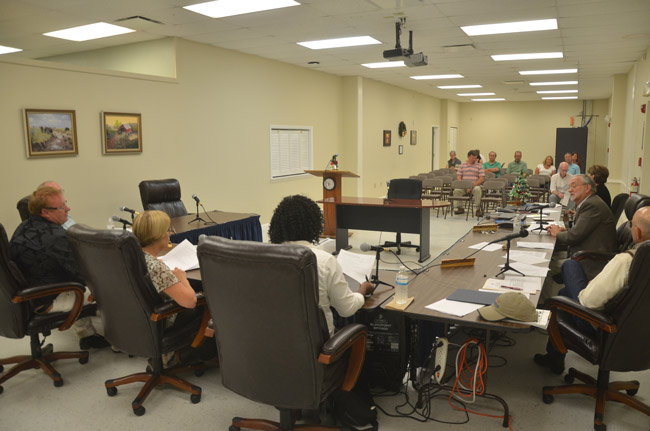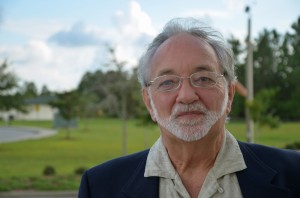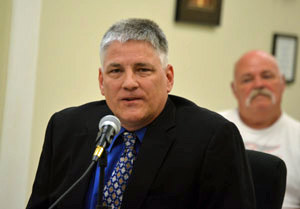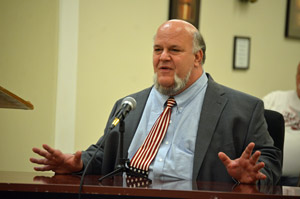
Even Mayor Catherine Robinson conceded: strange things happen in Bunnell. The Bunnell City Commission’s interview of three internal candidates for city manager Wednesday evening was one of those things.
Contrary to the posted agenda, which listed the interviews under commissioners’ action, the city commission did not interview the candidates. Its city manager did, even though that was not what commissioners had discussed or agreed upon ahead of time, at least not in an open meeting. And even though it’s the city commission’s job to interview its prospective manager—the only direct hire the commission is responsible for other than its city attorney.
Two years ago the administration drew up a set of questions for commissioners which they then edited and amended together before commissioners asked each candidate the questions. This evening, commissioners arrived for the meeting ready to ask questions, some of them with their own questions, but City Manager Larry Williams, who’s quitting this month, had drawn up his own, apparently without commissioners’ knowledge. And he said he would be asking his questions. He even initially sat himself at the interview table to face candidates head-on, in an old-fashioned, intimidating one-on-one, his back to commissioners, until commissioners put their foot down and told him to move back alongside them.

But they didn’t change the process. When Robinson asked her fellow commissioners if they were in agreement to conduct the process as Williams had drawn it up, none protested. So Williams rather than the commission interviewed his successor. Commissioners had a chance afterward to ask whatever additional questions they pleased. They asked only a handful.
As a result, the questions Williams asked were heavily centered on process and administrative style, and were mostly, strikingly disconnected from issues specific to Bunnell. The questions could have been asked of any city manager candidate, in any city, in any state, but were nevertheless revealing.
The interviews featured three internal candidates–Deputy City Clerk Dan Davis, Finance Director Stella Gurnee, and City Engineer Fernand Tiblier, in that order. They were to last an hour each. Davis’s almost did. But the remaining two split the following hour, with Williams in some cases asking questions before the candidate appeared to have finished his or her thought.
There were no follow-up questions, though there were awkward moments. In the third interview Williams said he felt like making a joke as a follow-up to one of the questions. “Probably not the time,” the mayor said, pointing at the candidate as an indication to Williams to get on with it, though in fairness the candidate she was pointing to–Tiblier–had himself made several cracks that seemed out of place: “I think you want me to be serious about that one,” Tiblier said after being asked about a low point in his career and answering that he’d once been hosed by an employee. He then said that he’d previously applied for a city manager’s job and discovered he “certainly wasn’t ready for it then.”
When it was over, none of the commissioners gave a hint of where they stood on the three. Williams tried to get them to rank the candidates. They did not, preferring to wait until next Monday, when they will have another special meeting to either pick one of the three or to open up the process to external applicants. The Monday meeting was Commissioner Elbert Tucker’s idea. He alone did not take notes during any of the interviews. He said he needed the time to do his own research.

Davis’s was the most candid, the most personal and at times the most wrenching of the three interviews. A 20-year veteran of the Air Force–a period he spoke of with admiration and affection never matched by the description of his 12 years in government–he quickly went to the heart of a matter that he clearly wanted to settle: his heated, public resignation at a meeting two and a half years ago. He said he “mishandled” that situation. “I let emotions and frustrations dictate my resignation, I took actions that hurt other people and I have a lot of regret about that.”
He returned to the incident at the end of his interview, apologizing to commissioners for his behavior and asking them not to hold that incident against him. “It’s not really in my character, it’s not who I am, it’s not something you can expect of me in my role as city manager, I’ve really grown a lot,” he said. He turned personal during the interview, too, when he spoke of ways he’d worked on his character, including his and his wife’s involvement in a “couples’ accountability group” which he said helped him a lot in addressing various issues. He said he sometimes spoke too soon and could be “judgmental,” but has been working on that as well.
The candor did not let up when he was asked successive questions about his experiences with utilities, public works, public safety and emergency management. “I have absolutely no experience with utilities, other than the fact of a few years of sitting in many meetings, taking minutes on items that deal with utilities,” he said, giving virtually the same answers for the other fields except for emergency management, in which case he drew on his Air Force experience.
For his strengths, he cited his organization skills, his motivation to do better. He spoke of his ability to keep staff motivated, his concern for the safety of a police department that’s shrunk considerably, his ability to handle complaints by listening and being fair. When asked why he should be picked over the two other contenders, he had an imaginative answer: “In selecting me you have the least to replace,” he said, because replacing Tiblier would be like finding a director who can fill three jobs. And he had a better grasp on the “bigger picture” than Gurnee does. He also noted that he was the lowest-paid of the three, therefore the “cheapest to replace.”
Mayor Robinson asked him how many people he’d supervised in his career. The range was seldom more than one or two, a number that contrasted with those of Tiblier and Gurnee, both of whom have supervised dozens at a time.

Gurnee’s interview was the shortest and most business-like–not because she had little to say, but because she did not at any point stray either into personal matters or witticisms. She kept her answers brief but documented with examples from her experience. The most personal she got was describing herself as “A Flagler county girl.” Her former city manager, if asked, she said, would “hire me back in a heartbeat.” Like Davis, she spoke of the military as a highlight in her career, citing the Army Commendation medal she received when her company moved from Ft. Benning, Ga., to Germany, and she was responsible for much of the administrative transfer.
In Port Orange, she took over leadership posts after she detected a colossal billing error, causing the dismissal of other directors. “There were citizen groups and officials who were not happy that I reported the error,” she said, but her ethics commanded otherwise. She said she led by example in an inclusive, collaborative manner, “but I will make a tough decision if I have to, and do it promptly.”
When asked about her experience with utilities, public works, public safety and emergency management, she cited experience in each case going back to Port Orange, where she’d developed budgets for those departments and in the case of utilities had developed a verification process in the wake of the billing error. She said she was called the “FEMA queen” during the 2004 storms, a reference to the Federal Emergency Management Agency and the four hurricanes of 2004 that required the filing of numerous claims for reimbursements through FEMA. “We had 97 percent return on the claims,” she said. But, she concluded, “there’s not going to be a city manager that’s done every department in the city. The city manager has to be good at getting the directors who have the knowledge and experience to run those departments in the city.”
Asked about the city’s staffing levels–one of the few questions that directly dealt with Bunnell’s issues–Gurnee said: “The city has an allocation problem of staffing. I think there is room to reallocate some of the staffing,” specifically from the administrative end. She also described the police department’s staffing as “critical.”
Her interview lasted just 19 minutes before commissioners took three more minutes to ask their questions.

Tiblier started with a joke. When asked what his former city manager would say if asked to re-hire him today, Tiblier, who wore a bright Stars and Stripes tie, said: “They’d better say yes.”
His career highlights, he said, had a lot to do with what Bunnell achieved in the last two years, with a new city hall, a new water plant and finding ways to fund new projects through grants. He also cited his being the first public work director and engineer for Deltona in the city’s infancy. He described his leadership style as “more carrot than stick,” and his strengths as someone good at math and “someone who gets along well in the sandbox.”
Asked about his method of handling pressure, Tiblier said: “Well, right now there’s pressure on my knee, I took a pill for that one.” Then he said he breathes deeply and steps back from a situation if necessary. “Pretty much by the end of the day I make peace with whoever might be presented as an antagonist to me,” he said.
His short-term goals for the city are to secure block-grant dollars for infrastructure, his long-term goals to preserve the “rural character” of Bunnell and support what’s meaningful to the community, which he described as “God and country” while shepherding “the kind of development that the city can identify with, and there are ways to do that through some regulation and some lack of regulation as well.” He did not elaborate, and Williams–who was on record as favoring Tiblier–did not ask him to.
When asked the successive questions about his experience with key city departments, he cited his involvement in utilities “pretty much my whole career,” ditto for public works, and described his involvement in a FEMA exercise to highlight his experience in emergency management. As for city staffing, he said it’s “deficient in the area of public safety,” though the rest of his answer took a different direction: “The police department had the biggest cut of all, and we know the sheriff is here to support us, that’s true, however, our police chief and his mission has been such that he’s there in the neighborhoods, he’s there with the people and I think he’s been a great leader.”
If he got the city manager’s job, he proposed replacing his own job with a “project manager type” employee “at maybe two-thirds of my present salary.”
Commissioner Rogers asked him about living out of the county, when the charter requires the city manager to be within 40 miles. The issue was a sore point two years ago with then-Manager Armando Martinez, who was in the habit of commuting to and from Brevard County, often at the city’s expense, though initially he kept a small house in Palm Coast, too. Tiblier gave no indications that he’d leave his Osteen house any time soon, as he keeps animals there and likes the community, though he suggested he might get a small place in Bunnell and contemplate a move in the future.
He then ended: “If you pick me, great, if you don’t, no hard feelings.”





























layla says
There is nothing normal about anything in Flagler County. Why should this surprise you?
Sara says
I sure hope they go external to get a City Manager.
JSS says
What’s with Bunnel, Flagler Beach and Palm Coast with these City Managers?
Managers work at the behest of the elected officials to serve the population of the city in a manner consistent with ICMA ethics and standards.
Elected officials that allow a manager to dictate policy are the issue. Man up and do the job you were elected to do.
What we have locally are bunch of highly dysfunctional organizations.
Welcome to Floriduh!